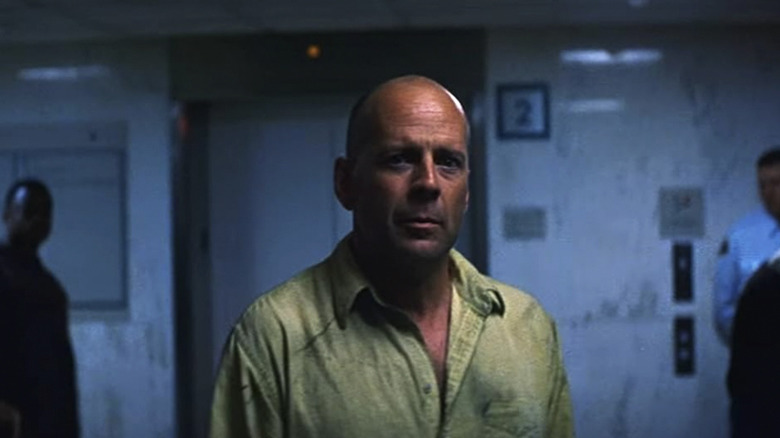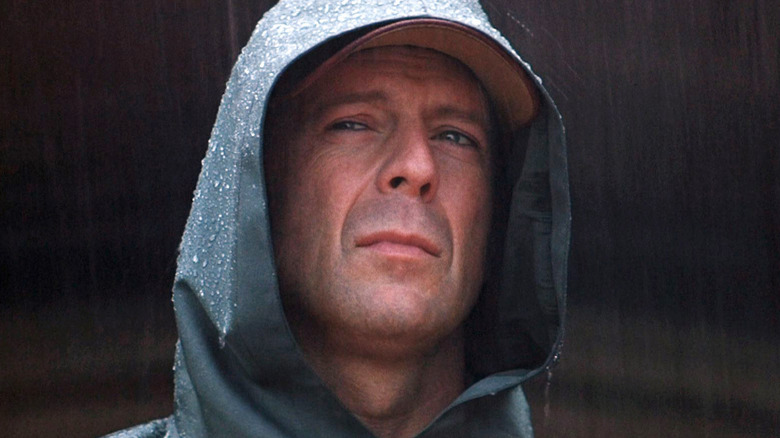The Bruce Willis Performance That Blew Quentin Tarantino Away
When Bruce Willis vaulted from television stardom to the motion picture big time in 1988 with “Die Hard,” he seemed destined for a long run as a blue-collar rake the likes of which movies had never seen. He possessed the incorrigibleness of Cary Grant and the two-fisted capableness of Gary Cooper, but he felt more accessible than either of them. Willis wasn’t erudite and he wasn’t trying to be. God no. His characters tended to be rough-and-tumble smartasses with moral compasses that pointed true north, men who made their share of mistakes and spent the average length of a feature film atoning for them as they went after bad men who sinned with impunity. He played well-meaning f***-ups we could identify with and perhaps look up to.
There was, however, another Willis, who I think was even more admirable (I’m using the past tense because, while still very much with us, he has sadly retired from acting). He was a true actor-star. He wanted to step outside of himself and play flawed men who found redemption sans MP5 machine gun. He wasn’t above playing an abusive scumbag (as he did in Alan Rudolph’s “Mortal Thoughts”), nor was he afraid to take third billing as an alcoholic disgrace of a journalist in a big-budget risk like Brian De Palma’s “Bonfire of the Vanities.” Willis wanted to stretch, but the parts and/or the projects didn’t always pan out. In several cases, they were outright flops. Fortunately, after he took it on the chin several times over in non-action roles during the early 1990s, Quentin Tarantino gifted him the wheelhouse part of Butch Coolidge in “Pulp Fiction.” As a pugilist driven by pride and anally-housed birthright, Willis was reckless perfection. At no point during Butch’s underworld odyssey do you think he’s going to survive, but, as we now know, men of his tenacious timber endure in Tarantino’s movies. They win.
A filmmaker as cocky as Tarantino might be liable, even correct, to claim that Willis’ portrayal of Butch was the star’s finest hour onscreen. But when asked by Sky Movies to name his favorite movies between the years of 1992 and 2009 (which, at the time of the interview, encompassed his filmmaking career), Tarantino went gaga for Willis in a hugely unconventional superhero film.
Quentin Tarantino’s love for Bruce Willis is Unbreakable
Had Bruce Willis not contractually owed Disney a movie as recompense for the disintegration of the unfinished “Broadway Brawler,” it’s very likely M. Night Shyamalan would’ve never had the clout to make a movie as sui generis as “Unbreakable.” But Willis, in signing on to play a dead man in “The Sixth Sense” (you’ve had so much time to watch this movie, I don’t want to hear it), helped Shyamalan earn the greenlight to mount his tale of a man who, as the sole survivor of a massive train derailment, discovers he’s a superhero.
In the aforementioned 2009 interview, Tarantino hailed “Unbreakable” as “one of the masterpieces of our time.” He found it “a brilliant retelling of the Superman mythology,” and made sure to single out his former collaborator Willis as “magnificent” in the role of David Dunn, saying it’s Willis’ “best performance on film that he’s ever given.” While I’ve always felt that Shyamalan curiously downplays the central metaphor of the movie (that Dunn’s powers are derived from his marriage, starting with the implication that he only survives the train wreck by putting his wedding ring back on), there’s no disputing Willis’ greatness in this comic book movie with the partial aesthetic of a Tarkovsky film. We live for movies like this, and to see a star like Willis make them possible. He is so very missed.
















Post Comment